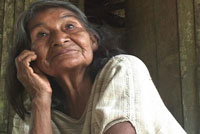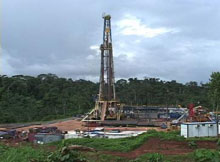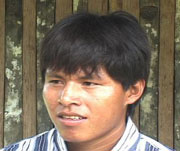The Politics of Petroleum
Air Date: Week of January 2, 2004
A giant gas-drilling project in the Peruvian Amazon was supposed to set a standard for environmental and cultural responsibility. But it lies in an indigenous area and since work began, it's raised questions. Part of a new series "Worlds of Difference" from independent producer Sandy Tolan and Homelands Productions.
Transcript
CURWOOD: It’s Living on Earth. I’m Steve Curwood.
Long ago, in the hot, moist folds of the Amazon, a people walked and walked, to keep the sun from setting. According to Peruvian writer Mario Vargas Llosa, the Machiguenga Indians, believed that if they stopped walking, the sun would fall from the sky. Then missionaries came, with other beliefs. Soon after, settlers arrived to Machiguenga territory. Today, businessmen tell the Machiguenga about a new kind of sun - a source of energy below ground - to be transformed into power, and money. For energy companies, the vast natural gas deposits on Indian land at Camisea represent energy independence for Peru and major exports to the U.S., where demand for gas is rising. For the ten thousand Machiguenga, it means change, the unkown. Now, this story, part of "Worlds of Difference," a series on global cultural change. It is reported by Jason Felch, Chris Raphael and Sandy Tolan, who narrates the story.
[SOUNDS OF JUNGLE, RIVER]
TOLAN: We move slowly, down river, in the thin light of crescent moon. Three of us North Americans, with three Machiguenga guides, in a long wooden boat powered by 55 horses in the back. We edge along the eddies of a small amazon tributary, looking to the shore for our place to land. Flashlights blink out at us like fireflies.
[SOUNDS OF WATER, BOAT ENGINE]
TOLAN: This is the edge of the new El Dorado, called Camisea. Beneath us lie trillions of cubic feet of natural gas. It’s said this will light up Peru, that this nation will use its Amazon to become an energy powerhouse, and that what’s left over will be turned into liquid and sent by ship to help power gas-hungry California.
[SOUND OF BIRDS]
MARIA: (Speaking Machiguenga) They say that there, under the ground, there is light that illuminates, but I’ve never seen it.
TOLAN: Morning now, in a Machiguenga village directly above the vast deposit of gas. An old woman sits cross-legged on a wooden porch.
MARIA: (Speaking Machiguenga) I don’t know what this gas is. Is it over there, or is it up above? Where might it be? I don’t know.
 |
|||||||||
|
MARIA: (Speaking Machiguenga) I think in the future, when I no longer exist, there will be hard changes. Now I hear noises in the mountains. What might it be? I don’t know. TOLAN: The noises, and the changes, come from the men who dig under the ground. Mrs. Maria knows about these men, because her grandson works for them – a boat ride away, at Camisea, where the gas will emerge from the belly of the earth. MARIA: (Speaking Machiguenga) My grandson already has another way of being. He’s educated, he generates income. But me, I can’t read. I don’t know what money is. TOLAN: The reporters ask the old woman: so, do you think this is a good thing, this gas project? What do I know? she asks. I have one foot in the grave. I see that the animals have run away, from all the noises. But my grandson has work. Go ask him. [BLARING CUMBIA MUSIC] TOLAN: Fifty yards away, outside his one-room shack, Mrs. Maria’s grandson lies back in his hammock. It’s a day off for Wilfredo Marvaredi Vargas, who does maintenance for the consortium of gas companies. MARVAREDI: (Speaking Machiguenga) I’m happy with the job I have. I don’t want to be lazing around the community. When I’m at home, I’m losing time. I like to work. I have something to earn. I can buy the things I need. TOLAN: Things, like the stereo in his room, hooked up to a car battery. Things, like money, which helps him court a Machiguenga woman in a village down river. MARVAREDI: (Speaking Machiguenga) We could be equal to the settlers. They have comforts, they have light. Now that the companies are here, we need to take advantage to improve our houses, to assimilate ourselves into society. [SONGS ON THE RADIO] TOLAN: Between Wilfredo Marvaredi and his grandmother: hope for progress, and fear of irreversible change. Mr. Marvaredi tells us he agrees with his grandmother that the animals are fleeing the noise from the machines. All along the river now, there are fewer animals and fish to eat. And many people here remember the 1980s, when gas workers first came to the area and nearly half of the tiny Nahua tribe was reportedly wiped out by epidemic disease. Wilfredo wonders about the price of gas. [TRAFFIC SOUNDS] TOLAN: But if you follow the gas, by pipeline out of the Amazon, across the frigid Andes, and down to the hazy capital of Lima, you will find officials who promise Wilfredo Marviredi and his grandmother need not worry. DEL SOLAR: We have done everything by the book, following World Bank standards in the way we treat the environment.
|







